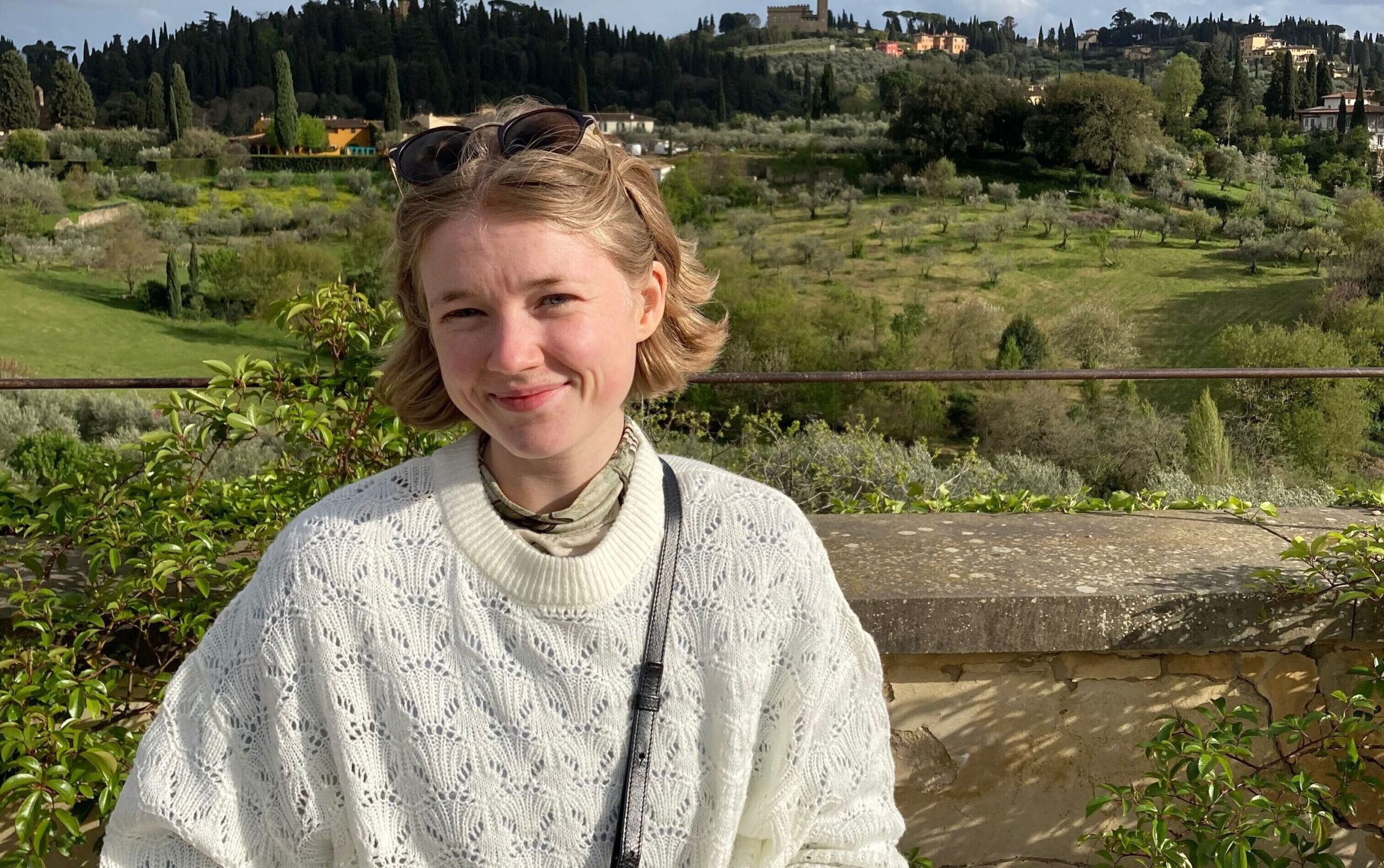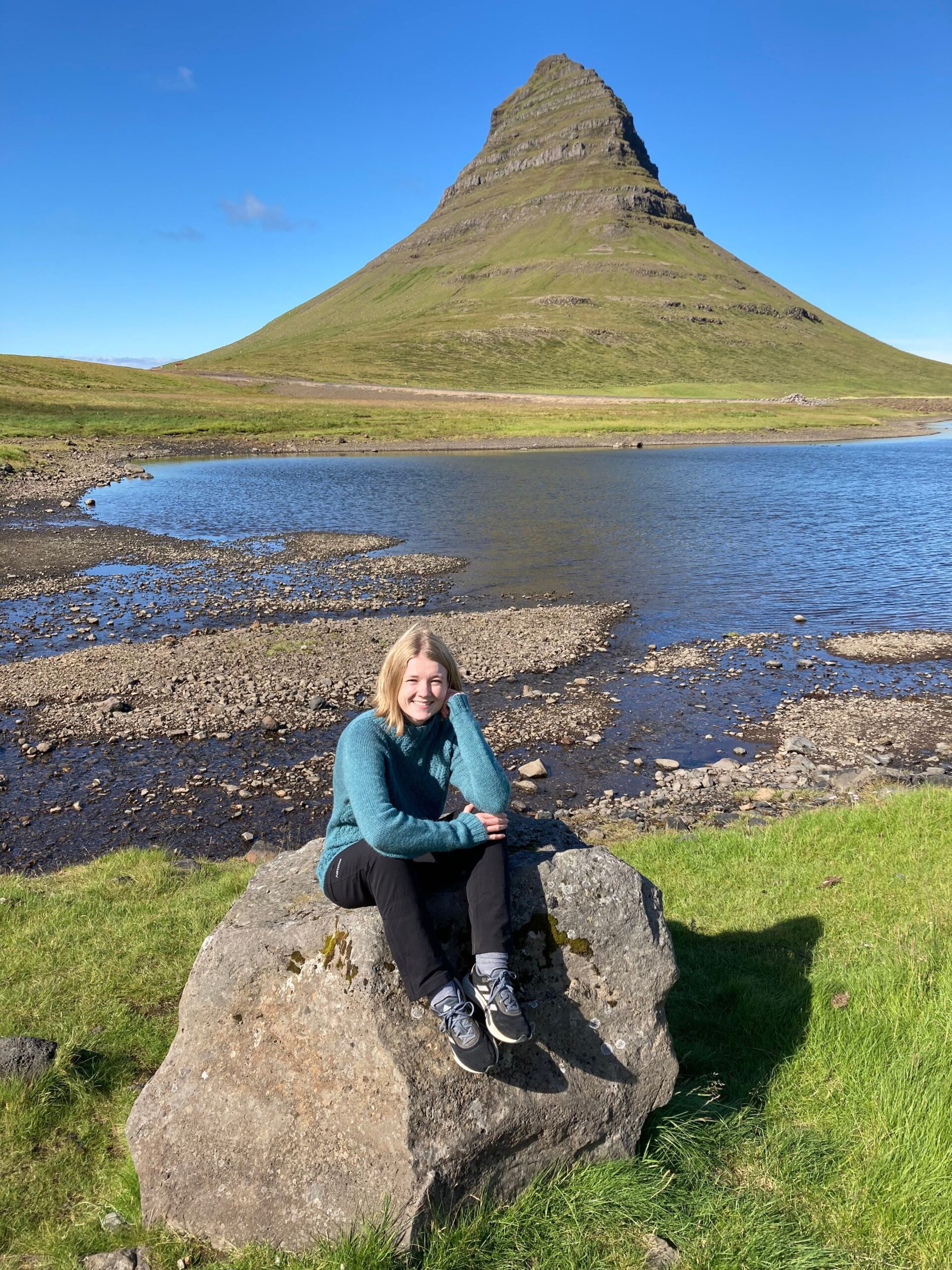
Sólveig Hilmarsdóttir talks about her research in Latin sociolinguistics and what language variation tells us about society.
There has always been, and there will always be, differences in the ways that people speak and use language because variation is a fundamental part of human language.
Sólveig Hilmarsdóttir
Sólveig Hilmarsdóttir [2022] fell in love with Classics and Latin grammar in secondary school. She is now in the final stages of her PhD thesis on Latin sociolinguistics, focusing on the corpus of Ciceronian correspondence – the extensive collection of letters exchanged by (and with) the prominent statesman and orator Marcus Tullius Cicero between 68 and 43 BCE.
“Working on topics in historical linguistics is often referred to as ‘making the best use of bad data’, following a comment by the American sociolinguist William Labov in the nineties,” says Sólveig. “Part of the goal with my thesis is arguing that we can use Latin literary data to answer sociolinguistic questions about the ancient world. I have focused on an underexplored aspect of this topic by looking systematically at the relationship between the social background of Latin authors and their language use.”
To do so, she analyses a variety of linguistic features in the letters exchanged with Cicero and uses statistical testing to see whether these correlate with aspects of the writers’ backgrounds or relationships with Cicero. Some of her findings mirror famous sociolinguistic patterns in Western societies in which socially mobile individuals use prestigious, ‘correct’ variants of the language to a greater degree than other groups in society, while carefully avoiding non-standard forms.
Sólveig talks about the social implications related to people᾽s language use. “Ideas about ‘correct’ or ‘proper’ language or language variants are a social construct. But these ideas can have a lot of influence on language variation and language change,” she says.
Sólveig talks about how growing up in Iceland gave her an early sensitivity to sociolinguistics. Like many societies, there is a strong sense of linguistic purism in Iceland, where certain varieties and features are perceived more negatively than others.
Childhood
Sólveig was born in Copenhagen, Denmark, where her parents lived temporarily to pursue their artistic careers. Her mother is a visual artist turned fiction writer and her father is a film composer. The family moved back to Iceland when Sólveig was two and she grew up in a small village on the outskirts of the capital city, Reykjavík.
When she was younger, Sólveig dreamed of studying in France and becoming a writer. “I loved reading as a child and I loved languages. My mother, who had lived in France and studied French when she was young, and who is a writer of literary fiction, was my absolute idol,” she says. Sólveig went to her local primary school in Álftanes, but then attended Menntaskólinn í Reykjavík, a public secondary school in the city centre of Reykjavík. It is the only secondary school in the country which still teaches Latin and Greek. Sólveig says the quality of Latin and Greek teaching at her school was very high.
 She states: “People in the UK often seem a bit surprised to hear that Latin and Greek are taught not just in the countries that they perceive to have the most immediate connections or claims to the classical world. But we should remember that a very wide range of the world᾽s nations have strong connections with education in Latin and Greek and long classical traditions.” Sólveig mentions a recent publication edited by Steven Hunt and John Bulwer, Teaching Classics Worldwide, in which a variety of educators discuss classics teaching all over the world: in Europe, the Americas, Australasia, the Middle East, Asia and Africa.
She states: “People in the UK often seem a bit surprised to hear that Latin and Greek are taught not just in the countries that they perceive to have the most immediate connections or claims to the classical world. But we should remember that a very wide range of the world᾽s nations have strong connections with education in Latin and Greek and long classical traditions.” Sólveig mentions a recent publication edited by Steven Hunt and John Bulwer, Teaching Classics Worldwide, in which a variety of educators discuss classics teaching all over the world: in Europe, the Americas, Australasia, the Middle East, Asia and Africa.
Sólveig took up Latin in the second year of secondary school. Her immediate interest was in the grammar of the language, and this has remained her focus to date. “Very quickly my interest moved from French to Latin. I remember the first Latin lessons we had quite vividly,” she says. “I found the smallest things amazing, such as the Latin ablative which is a grammatical case that has not been preserved in Icelandic.” She discovered that the acquisition of Latin grammar was helpful for thinking about grammar in languages more generally, including in her native language Icelandic.
The next year, she took up Greek as well after her Latin teacher told her that to be a real classicist, you needed to know both languages. “I am not sure I would necessarily agree with the sentiment that all classicists must know both languages, but I am very glad I took the advice!” she states. “Though my research interests mainly lie in the Latin language, I have always really enjoyed studying and teaching Greek too.”
Undergraduate studies
For her undergraduate studies, Sólveig read for a double degree in Latin and Greek at the University of Iceland, which included a year spent as an Erasmus+ student at the University of Glasgow.
Her undergraduate degree course was very broad. She studied a wide variety of courses, ranging from Greek and Roman history to ancient philosophy, as well as a broad range of classical texts and authors. She wrote two undergraduate theses; one on the language of the Latin poet Propertius and one on the Greek and Latin participial systems. Both of these were largely written during the Covid-19 pandemic which affected Sólveig᾽s final two undergraduate years.
Cambridge
In the autumn of 2021, Sólveig moved to Cambridge for her MPhil in Classics. Sólveig worked on bilingualism in Ovid, looking at changes in his language after he was exiled to Tomis, a remote Black Sea town in Romania in the region of modern Constanta. There has been a long debate on the topic of whether his language use changed after he was exiled, but Sólveig wanted to take a more objective approach to the question and focused on Ovid’s use of Greek vocabulary.
Ovid indicates that the two main languages spoken in Tomis at the time were Getic and Sarmatian, neither of which have been preserved, and neither of which can be found in Ovid’s poetry. As the third language spoken in the area was Greek, Sólveig worked on Ovid᾽s use of Greek vocabulary and found that, surprisingly, his use of Greek decreased in exile. She put this into context using concepts from modern sociolinguistic theory. She says: “Sometimes when people᾽s position in the so-called linguistic marketplace is demoted, they may need to watch their language use more and stick closer to the standard.”
During Sólveig᾽s MPhil studies, she applied for a PhD in Classics and her faculty put her forward for a Gates Cambridge scholarship. She began her PhD in 2022, and moved on to pursue wider questions in Latin sociolinguistics, focusing on the relationship between the social background of Cicero᾽s correspondents and their language use. Sólveig knew she was interested in a synchronic approach to Latin, focusing more on how the language was spoken at a given point in time rather than purely on how it changed over time. Her supervisor at Cambridge all the way through has been Professor James Clackson.
Sólveig has published articles and chapters on her postgraduate work, including a paper in the Journal of Historical Sociolinguistics. While at Cambridge, Sólveig has participated actively in the life of the Faculty of Classics, for instance, as postgraduate representative. She was also an organiser of a Wikipedia Edit-a-thon Classics Beyond the Canon, in which participants created Wikipedia pages for people who are of significance within the classical world or the classical tradition, but who have been overlooked due to their gender, race or other minority characteristics.
Sólveig hopes to keep working on the language and society of the ancient world as well as on historical linguistics once she finishes her PhD thesis. “There is a lot of public interest in ancient society, sociolinguistics and language change,” she says.
Her planned postdoctoral work will focus on language attitudes in ancient Rome. The topic has some real-world implications. “Many of our ideas about language use in the past continue to influence current attitudes towards language and language use,” she says. “We can relate this to a concept that has been termed the “Golden Age Principle”, which is the idea that language use used to be perfect in the past, but that the language varieties spoken today are somehow debased. But looking at the past shows us that these ideas also existed 2,000 years ago. There has always been, and there will always be, differences in the ways that people speak and use language because variation is a fundamental part of human language.”












